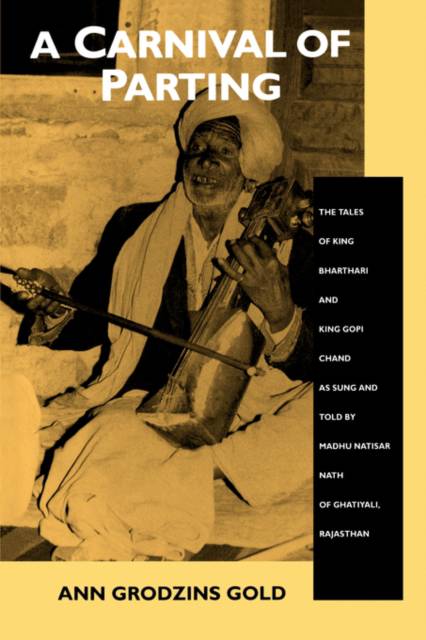
- Retrait gratuit dans votre magasin Club
- 7.000.000 titres dans notre catalogue
- Payer en toute sécurité
- Toujours un magasin près de chez vous
- Retrait gratuit dans votre magasin Club
- 7.000.0000 titres dans notre catalogue
- Payer en toute sécurité
- Toujours un magasin près de chez vous
A Carnival of Parting
The Tales of King Bharthari and King Gopi Chand as Sung and Told by Madhu Natisar Nath of Ghatiyali, Rajasthan
Ann Grodzins Gold
Livre broché | Anglais
59,45 €
+ 118 points
Description
Madhu Natisar Nath is a Rajasthani farmer with no formal schooling. He is also a singer, a musician, and a storyteller. At the center of A Carnival of Parting are Madhu Nath's oral performances of two linked tales about the legendary Indian kings, Bharthari of Ujjain and Gopi Chand of Bengal. Both characters, while still in their prime, leave thrones and families to be initiated as yogis--a process rich in adventure and melodrama, one that offers unique insights into popular Hinduism's view of world renunciation. Ann Grodzins Gold presents these living oral epic traditions as flowing narratives, transmitting to Western readers the pleasures, moods, and interactive dimensions of a village bard's performance.
Three introductory chapters and an interpretive afterword, together with an appendix on the bard's language by linguist David Magier, supply A Carnival of Parting with a full range of ethnographic, historical, and cultural backgrounds. Gold gives a frank and engaging portrayal of the bard Madhu Nath and her work with him.
The tales are most profoundly concerned, Gold argues, with human rather than divine realities. In a compelling afterword, she highlights their thematic emphases on politics, love, and death. Madhu Nath's vital colloquial telling of Gopi Chand and Bharthari's stories depicts renunciation as inevitable and interpersonal attachments as doomed, yet celebrates human existence as a "carnival of parting."
Three introductory chapters and an interpretive afterword, together with an appendix on the bard's language by linguist David Magier, supply A Carnival of Parting with a full range of ethnographic, historical, and cultural backgrounds. Gold gives a frank and engaging portrayal of the bard Madhu Nath and her work with him.
The tales are most profoundly concerned, Gold argues, with human rather than divine realities. In a compelling afterword, she highlights their thematic emphases on politics, love, and death. Madhu Nath's vital colloquial telling of Gopi Chand and Bharthari's stories depicts renunciation as inevitable and interpersonal attachments as doomed, yet celebrates human existence as a "carnival of parting."
Spécifications
Parties prenantes
- Auteur(s) :
- Editeur:
Contenu
- Nombre de pages :
- 392
- Langue:
- Anglais
Caractéristiques
- EAN:
- 9780520075351
- Date de parution :
- 19-01-93
- Format:
- Livre broché
- Format numérique:
- Trade paperback (VS)
- Dimensions :
- 156 mm x 232 mm
- Poids :
- 639 g

Les avis
Nous publions uniquement les avis qui respectent les conditions requises. Consultez nos conditions pour les avis.






